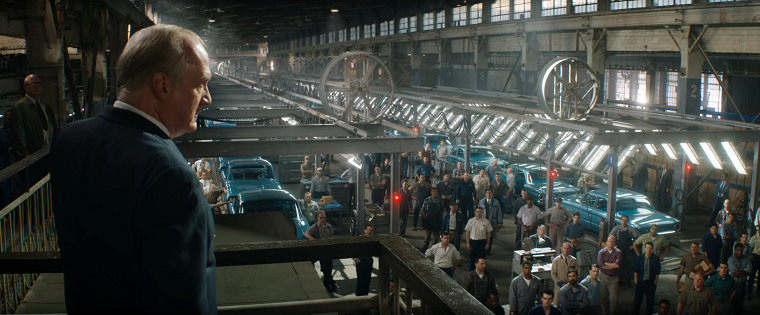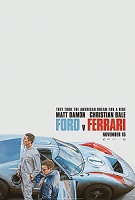I walked into my local theater’s showing of Ford v Ferrari with modest expectations. On the one hand, it was directed by the same man behind the excellent Logan, features not one but two Academy Award-winning actors in Christian Bale and Matt Damon, and had a not-insignificant budget of just under $100 million. All of this should have suggested I was in for a good time.
On the other hand, it is a racing movie — and Hollywood tends to misrepresent racing in ways that can be hard to overlook for people familiar with the real thing.
But, having walked in with modest expectations, I came out impressed. So let’s talk about Ford v Ferrari, a movie about the rivalry between two automotive giants that culminated in the famous 24-hour race at Le Mans in 1966.

Genre: Sports Drama
Director: James Mangold
Distributor: 20th Century Fox
Release Date: November 15, 2019
Cast: Matt Damon, Christian Bale, John Bernthal, Caitriona Balfe, Tracy Letts, Josh Lucas
Running Time: 152 minutes
Related: Ford vs the competition 
Ford v Ferrari does many things well. The cinematography is lovely and the attention to period details is great. I truly felt as though I had been thrust back into the 1960s to watch an interesting story unfold. It also goes without saying that both leads are excellent. Damon is convincing as the slick-talking Carroll Shelby, stuck between the world of race cars and that of corporate politics. Bale is his usual intense method-acting self; at first he seems a little over the top in his depiction of the admittedly outlandish Ken Miles, but by the end of the movie, he is entirely endearing. He makes it easy to root for him.
The movie also gets much of the automotive jargon right, delving into technical details with accuracy, even mentioning the honeycomb panel design of the J-car prototype that Miles was testing after the 1966 race, despite it being unimportant to the scene. Those little details, from the perspective of someone who understands them, really sell the movie.
Like other good Hollywood racing movies, such as Rush or even sports pictures in general, Ford v Ferrari isn’t really about the racing. It’s about the people involved and how their personalities manifest and interact when put under the competitive pressures of high-stakes racing. And with such capable actors in the lead roles, it proves a winning formula.

Because I knew the story would be told from the point of view of Ford, which ultimately wins the “war,” I had concerns Ferrari would be derisively depicted as an evil Goliath with Ford as the David figure, when in truth the American company’s resources dwarfed that of the Italian team.
But I was surprised to discover the movie spends little time depicting Ferrari at all beyond making it clear that all Enzo cared about was racing (which was indeed true to the real man). Instead, the movie paints an almost shockingly negative image of Ford as its internal politics repeatedly get in the way of its own racing program.
“How Ford beat Ferrari despite itself thanks to the efforts of people like Shelby and Miles” could have been a more accurate title, though it must be said that not everyone at Ford is portrayed negatively in the film. Jon Bernthal’s character, whom I wish had more screen time in the second half, plays a fairly levelheaded vice president. Henry Ford II, played by Tracy Letts, is portrayed with surprising depth — at times petulant, at others amenable, and in one particularly memorable scene, even sincerely vulnerable.
Josh Lucas’s Leo Beebe, on the other hand, is a caricature of the evil corporate man that brings me to…the bad.

In its attempts to play up Ken Miles’s hero story and guide the audience’s emotions, Ford v Ferrari plays fast and loose with history. It’s true that it never claims to be a documentary, but I do wonder if it is necessary for the movie to be as misleading as it is.
For instance, one of the big movie arcs revolves around Miles having been told he could not race the GT40 he helped develop at the 1965 race at Le Mans. Instead, the movie has him working in the garage as he listens to the race commentary over the radio; then he has to prove himself at the 24 Hours of Daytona to earn his drive in the next race while Beebe conspires against him. Yet in the real world, Miles did race at Le Mans in 1965, and Ford would have had no reason to exclude him considering the sheer number of cars it brought to the race in the first place — it certainly needed the drivers.
But that’s one thing the movie conveniently overlooks: Reliability was such a concern at Le Mans, especially with how hard Ford and Ferrari were pushing each other, that the two companies were essentially throwing cars at the race in the hopes that at least one would finish out front. In the 1966 event, Ford had brought 12 cars and Ferrari 14.
Pit Stop: Get the best service for your vehicle
Ford v Ferrari also undermines several real individuals — including bona fide racing legends — to bolster Miles by contrast. Bob Bondurant, who the movie names as one of the undeserving drivers replacing Miles in the 1965 race, was, like Miles, also heavily involved in the development of the iconic GT40 and a friend of Shelby’s. And in the 1966 race that he arguably should have won, Miles was not laps ahead like the movie claims — rather, he had been racing Bruce McLaren hard for most of the event. Nor did Miles set the fastest lap of the race, which the movie plays up as “the perfect lap” (McLaren’s teammate Chris Amon, in the other GT40, had that honor).
There are other examples of how Ford v Ferrari takes liberties with what really happened, but truth be told, they probably won’t upset anyone that isn’t invested in racing or in history.
The usual Hollywood-isms are also there. Drivers regularly pass others by suddenly shifting gears and mashing in the throttle, as though they hadn’t already been doing that. I won’t make a list of these things because the movie does get other details right, and this is the kind of stuff I expected before walking in — and it’s why racing movies are always better when they focus on the people, as Ford v Ferrari did.
Ford v Ferrari is thoroughly enjoyable, even for a racing fan such as myself and for a non-racing fan such as my wife, who watched with me. Despite its flaws, I would definitely recommend it to anyone who doesn’t abhor sports dramas.
Kurt Verlin was born in France and lives in the United States. Throughout his life he was always told French was the language of romance, but it was English he fell in love with. He likes cats, music, cars, 30 Rock, Formula 1, and pretending to be a race car driver in simulators; but most of all, he just likes to write about it all. See more articles by Kurt.











